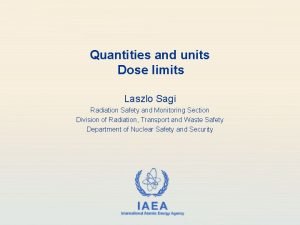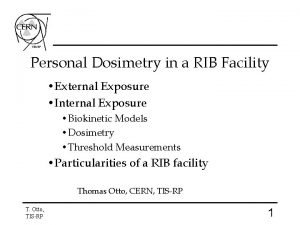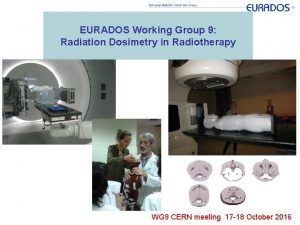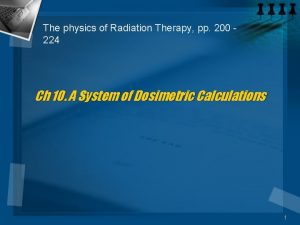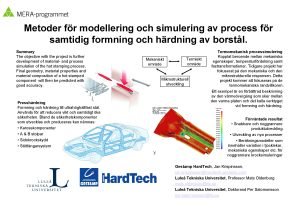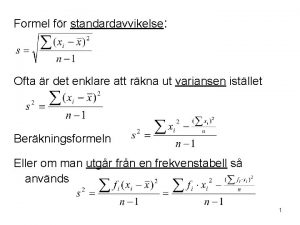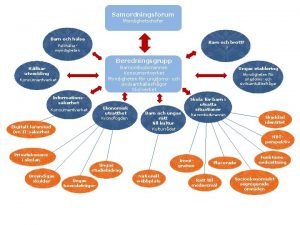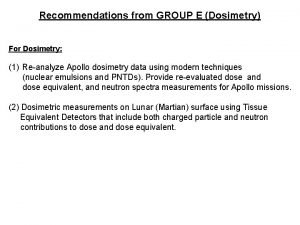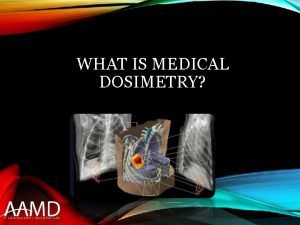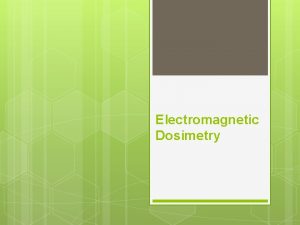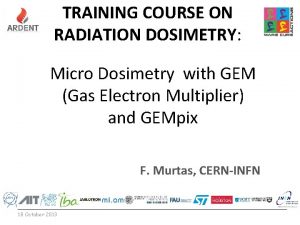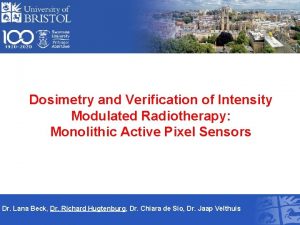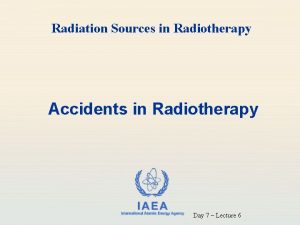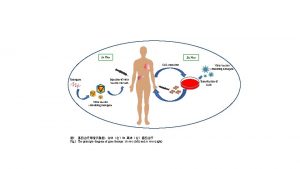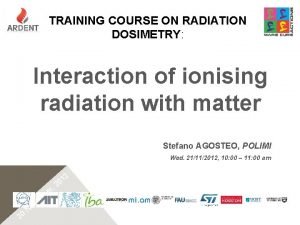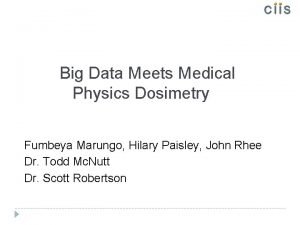a SiEPID for radiotherapy in vivo dosimetry A














































- Slides: 46

a. Si-EPID for radiotherapy in vivo dosimetry A. Piermattei (Roma) 10 th International Conference on Radiation Effects on Semiconductor Materials, Detectors and Device FIRENZE 8 - 10 Oct. 2014

Following the EURATOM 97/43 recommendation, since 2000 is operative in Italy the D. L. vo 187/00 about the radioprotection of the patients undergone at medical radio exposition. In radiotherapy the number of Quality Controls is increasing as function of the treatment complexity and the workload is responsible of their partial absence that increases errors. Moreover in this field severe incidents have been recently reported by the media.

Tumor Control Probability

Opinion of many physicists is that a dosimetric control during the treatment using a dedicated software for the in-vivo dosimetry (IVD) could strongly reduce the presence of dosimetric errors. This mean a major presence of physicists during the radiotherapy treatment execution, where actually there is a general absence of this professional component. Moreover the IVD is one of the best ways to gain experience to prevent errors when introducing new radiotherapy techniques.

THE DISO PROGET, SUPPORTED BY “ISTITUTO NAZIONALE di FISICA NUCLEARE” INFN, AND UNIVERSITA CATTOLICA S. C. ROMA , INTEND TO DEVELOPE SOFTWARE FOR THE IN-VIVO DOSIMETRY CONTROL USING a. Si-EPIDs Parma Azienda Ospedaliera Universitaria Firenze Centro Oncologico Fiorentino LINAC Viterbo Ospedale Belcolle Roma Università Cattolica Roma Campus Biomedico Campobasso Fondazione Giovanni Paolo II Rionero in Vulture Ospedale Oncologico Regionale CROB Cagliari Presidio Oncologico Businco EPID website: www. infndiso. altervista. org

1024 x 1024 or 1024 x 768 pixel

a. Si EPIDs dosimetric caracteristics have been studied for different x-ray beams of different linacs, in terms of : - reproducibility - linearity - ghosting effect - dose rate dependence - radiation damage and a simple procedure for the a. Si EPID calibration was investigated. References in www. infndiso. altervista. org

DISO AIMS Easy implementation on linacs Varian, Elekta e Siemens The tests can be obtained in quasi real time due to the interfacing with the R&V of the Center

In the recent years 20. 000 IVD tests for 3 DCRT treatments have been obtained in 8 Italian Centers participating at the DISO Project using a software prototype. On the basis of these results recently the: BEST Medical Italy developed the version SOFTDISO-3 DCRT

THE SOFTDISO-3 DCRT SUPPLIES TWO TESTS: 1) The first test is the ratio between the reconstructed dose Diso at the isocenter point, and that planned Diso, TPS by TPS R = Diso/ Diso, TPS 3 D CRT beam acceptance criteria: 0. 95 ≤ R ≤ 1. 05

2) The second test is a g analysis test between a reference EPID image (REI) acquired at the first fraction and the current obtained during the successive fractions. This is a suitable tool to find causes of incorrect beam delivery reproducibility. reference image current image distribution of points in disagreement Pg˃1 Our experience suggests a pass-rate with Pg<1 ≥ 90%

Causes of IVD discrepancies: 1. Patient Set-up 2. Occasional morphological changes 3. Systematic morphological changes 4. Attenuators on the beams (patient supports) 5. TPS implementation 6. CT number implementation 7. Laser misalignments 8. Output dose variations 9. Inaccurate MLC positions …generally due to inadequate quality controls.

Recent results of 281 patients tested by the version SOFTDISO-3 DCRT 1500 281 patients are here reported. R ratio for single 5000 test (5603) 89% of tests within 4500 5% R 1250 Pg<1 4000 1000 3500 Mean R ratio for patient (281) 100% of tests within 5% 750 3000 Gamma analysis for 5241 test 87% of tests show Pg>90% 2500 2000 500 1000 250 500 0 0 0, 84 0, 88 0, 92 0, 96 1, 00 1, 04 1, 08 1, 12 1, 16 55 65 75 85 95

Some more frequent warnings obtained by the SOFTDISO-3 DCRT in the italian Centers using : Varian, Elekta and Simens linacs

Brest irradiation, at the 3°test an incorrect setup, well evident by the shift of the green signal profile, the dose at the isocenter point increased R=1. 062 and………. R=1. 062

…. also the g analysis shows the change of setup of about 1. 5 cm grather than the tolerance (0. 5 cm) and the Pg<1 = 72. 6% out of tolerance level. REI

Head tumor. Attenuating support not included in the TPS computation, R<0. 95 R=0. 906

Attenuating support was in the TPS, computation R values within the tollerances R=0. 982

Pelvic tumor. The R ratios are within the tolerance level of 5% even if the beam at 180° intercept a couch support and………. .

. . . the presence of coch -attenuator off the beam central axis is well detected by the g analysis that shows a Pg<1 = 25%. these underdosages areabout 10%.

Pelvic tumor : the g-analysis supplied a Pg<1 = 54% due to the Belly bord shifted of about 2 cm. The dose discrepancy is up to 20%. 22 cm

Pelvic tumor Presence of a distended rectum in the planning CT-scan. At the 1°and 3°tests the rectum is again distended by gas and R ratios are within the tolerance, but at the 2°test the pocket size decreased and R= 0. 907 this means dose variations estimated in 10%. R= 0. 907


Pelvic tumor. Large gas pocket in the TC scan used for planning. The R ratios aa the tolerance but the profiles change, and……. are within

. . the g-analysis supplied a Pg<1 = 76. 8% , underdosages up to 15% can be estimated by the profiles ( these could be responsible of recurrences).

Some results obtained during the DISO Project in the field of adaptive planning when major systematic anatomical changes occur

Some IVD tests have supplied informations about lung tumor variations, successively confirmed by new CT scans. In some cases an adaptive plan (to reduce the lung toxicity and/or to supply tumor dose escalation) have been realized, as reported in Medical Physics of 2009 ….

2 CT

Gantry 252° Gantry 293° Gantry 60° Microcitoma treated by 3 fields. After the first weak the R tests showed an increase and after the 6 th test all the R ratios were out of tolerance as the g-analysis……

Summary of the g-analysis on the 2 D EPID images REI 60° 229° 293° After one week At half treatment. P g<1 81% 82% P g<1 70% 63% 76% 93%

Gantry 252° Original CT scan Gantry 293° for CT scan adaptive The new CT scans confirmed a tumor regression and a adattive plan was used for the residual tumor. The R ratios improved

RESULTS OBTAINED BY SOFTDISO VERSIONS DEVELOPED BY BEST MEDICAL ITALY FOR -Intensity Modulated RT IMRT -Volumetric Modulated Arc T VMAT BEAMS

IMRT STEP-SHOOT( Elekta) for pelvic tumor : 5 R tests at gantry 180°are within the tolerace lvels but at the 2 th test Pg<1= 73% is due to the presence of a couch attenuator support on the beam suppling a underdosage of about 30% well estimated along the cranio-caudal profile 180

IMRT SLIDING WINDOW (Varian) for Head-Neck tumor : the R determinations for the field at gantry at 103°in the first 3 days is within the tolerance levels. Successively R increases up to 1. 13 and Pg<1 = 64 % , due to a shrinkage in the mandibular region and consequent change of patient setup

IMRT SLIDING WINDOW (Varian) for Head-Neck tumor : casual beam interruptions are frequent. In the present case, two linac-interruptions occored at the 3 th test, for the field at gantry 206°, both were restarted but the R= 0. 155 and Pg<1 =18% were due to a partial delivery dose.

VMAT

VMAT (Elekta) for H-N tumor : R determinations for one arc (179°-181) in 6 days are within the tolerance levels but at the 3°test the g-analysis in real time supplies a Pg<1 = 61 % due to a shift of the patient setup. New radiological immages were required confirming …………. 179 - 181

…………. . a shift of the patient setup about 1. 5 cm ( off tolerance level = 0. 3 cm)

Conclusions: SOFTDISO-3 DCRT and the successive SOFTDISO versions for IMRT and VMAT are able to supply in quasi real time the Diso test and the EPID images γ-analysis. Even if the γ-analysis between EPID images is not a true 2 D dosimetric comparison, the IVD result supplies a suitable option to intercept the causes of incorrect reproducibility of the dose delivery. The tests in quasi real time are possible because the SOFTDISO is interfaced with the Record and Verify system of the Center.


References 1) In vivo dosimetry by an a. Si-based EPID Medical Physics 33 (11) November, (2006) 2) Portal dose measurements by a Physica Medica 23, 67 -72, (200 3) Large discrepancies between planned and actually delivered dose in IMRT oh head and neck cancer. A case report. Tumori, A juornal of Experimental and Clinical Oncology, 93, 319 -322, (2007) 4) Breast in vivo dosimetry by a portal ionization chamber Medical Physics 34(2), February, (2007) 5) Application of a practical method for the isocenter point in vivo dosimetry by a transit signal Physics in Medicine and Biology 52, 5101 -5117, (2007) 6) EPID cine acquisition mode for in-vivo dosimetry in dynamic arc radiation therapy Nuclear Instruments and Methods in Physics Research B, 266 (4), 658 -666 (2008). 7) Dynamic conformal arc therapy: Transmitted signal in vivo dosimetry Medical Physics, 35 (5), 1830 -39 (2008). 8) A method to determine the planar dose distributions in patient undergone radiotherapy Nuclear Instruments and Methods in Physics Research B, 266 (11), 2643 -2650 (2008). 9) Real time transit dosimetry for the breath-hold radiotherapy technique: an initial experience Acta Oncologica, 47, 1414 -21 (2008). 10) In patient dose reconstruction using a cine acquisition for dynamic arc radiation therapy Medical & Biological Engineering & Computing, 47, 425 -33 (2009). 11) Integration between in vivo dosimetry and image guided radiotherapy for lung tumors Medical Physics, 36 (6), 2206 -2214 (2009).

12) Dose-guide radiotherapy for lung tumors Medical & Biological Engineering & Computing. 48: 79 -86, (2010). 13) Calibration of portal imaging devices for radiotherapy in-vivo dosimetry Nuclear Instruments and Methods in Physics Research A. n. 623, 829 -831, (2010). 14) Breast in-vivo dosimetry by EPID Journal of applied clinical medical physics. 11(4) 249 -262 , (2010). 15) Generalized EPID calibration for in-vivo transit dosimetry A. Fidanzio, S. Cilla, F. Greco, L. Grimaldi, L. Azario, D. Sabatino, G. D’Onofrio, A. Piermattei EJMP, Phys. Med. 27(1) 30 -38, (2011). 16) A generalized calibration procedure for a in vivo transit dosimetry using Siemens electronic portal imaging devices Medical of Biological Eng. & Computing 49; 373 -383, (2011). 17) Correlation functions for Elekta a. Si-EPIDs used as transit dosimeter for open fields. Journal of Applied Clinical Medical Physics, 12, 1, 218 -233, (2011). 18) Calibration of Elekta a. Si EPIDs used as transit dosimeter Technology in Cancer Research & Treatments. 10. 39 -48 , (2011). 19) Real time dose reconstruction for wedged photon beams: a generalized procedure. Journal of Applied Clinical Medical Physics, vol. 12, 124 -138, (2011). 20) A National Project for in-vivo dosimetry procedures in radiotherapy: first results Nuclear Instruments and Methods in Physics Research B 274, 42 -50, (2012). 21) ASi-EPID transit signal calibration for dynamic beams: a needeful step for the IMRT in vivo dosimetry. Medical of Biological Eng. & Computing, 51: 1137 -1145, (2013). 22) An in-vivo dosimetry procedure for Elekta step and shoot IMRT S. Cilla, L. Azario, F. Greco, A. Physica Medica 30(4) 419 -26, (2014) 23) Quasi real time in vivo dosimetry for VMAT A. Fidanzio, A. Porcelli, L. Azario, F. Greco, S. Cilla, M. Grusio, M. Balducci, V. Valentini, A. Piermattei, Med. Phis. 41(6) 2014


IIMRT sliding window beam at 206° splitted in two step. Two deliveries are presented 3° and 4° fractions 3° frazione 4° frazione

All the current IVD supply estimations of the real delivered doses in patient. Indeed even the more complex clinical IVD procedures (3 D) based on EPIDs, use initial reference CT scans ( for the planning) to reconstruct the x-ray fluence to use in a second step for the recomputation of the dose in the same reference CT scans. Then if the patient’s shape or setup are changed, the reconstructed fluence is not accurate and so the reconstructed doses. Only a wide-spread use of image guided radiation therapy (CBCT)could assure more accurate daily dose distributions, but also higher doses at normal tissues and time consuming. For these reasons the IVD tests must supply in real time useful warnings to activate quality controls to remove the causes of errors.

Staff of physicists Associated at INFN for the DISO Project website: www. infndiso. altervista. org omme
 Internal dosimetry
Internal dosimetry Internal dosimetry
Internal dosimetry Radiotherapy
Radiotherapy Mayneord factor equation
Mayneord factor equation Radiotherapy
Radiotherapy Ssd and sad technique in radiotherapy
Ssd and sad technique in radiotherapy Siemens radiotherapy
Siemens radiotherapy Radiotherapy
Radiotherapy Tillitsbaserad ledning
Tillitsbaserad ledning Bat mitza
Bat mitza Bästa kameran för astrofoto
Bästa kameran för astrofoto Olika rim dikter
Olika rim dikter Nyckelkompetenser för livslångt lärande
Nyckelkompetenser för livslångt lärande Tidböcker
Tidböcker Gibbs reflekterande cykel
Gibbs reflekterande cykel Shingelfrisyren
Shingelfrisyren Stål för stötfångarsystem
Stål för stötfångarsystem Vilken grundregel finns det för tronföljden i sverige?
Vilken grundregel finns det för tronföljden i sverige? Big brother rösta
Big brother rösta Verktyg för automatisering av utbetalningar
Verktyg för automatisering av utbetalningar Shivaiter
Shivaiter Vad är hsil
Vad är hsil Lyckans minut erik lindorm analys
Lyckans minut erik lindorm analys Strategi för svensk viltförvaltning
Strategi för svensk viltförvaltning Romarriket tidslinje
Romarriket tidslinje Boverket ka
Boverket ka Vad är verksamhetsanalys
Vad är verksamhetsanalys Typiska novell drag
Typiska novell drag Tack för att ni har lyssnat
Tack för att ni har lyssnat Läkarutlåtande för livränta
Läkarutlåtande för livränta Cks
Cks Inköpsprocessen steg för steg
Inköpsprocessen steg för steg Påbyggnader för flakfordon
Påbyggnader för flakfordon En lathund för arbete med kontinuitetshantering
En lathund för arbete med kontinuitetshantering A gastrica
A gastrica Egg för emanuel
Egg för emanuel Atmosfr
Atmosfr Formel standardavvikelse
Formel standardavvikelse Rutin för avvikelsehantering
Rutin för avvikelsehantering Presentera för publik crossboss
Presentera för publik crossboss Treserva lathund
Treserva lathund Myndigheten för delaktighet
Myndigheten för delaktighet Debattinlägg mall
Debattinlägg mall Var 1721 för stormaktssverige
Var 1721 för stormaktssverige Tack för att ni lyssnade
Tack för att ni lyssnade Tobinskatten för och nackdelar
Tobinskatten för och nackdelar Nationell inriktning för artificiell intelligens
Nationell inriktning för artificiell intelligens
